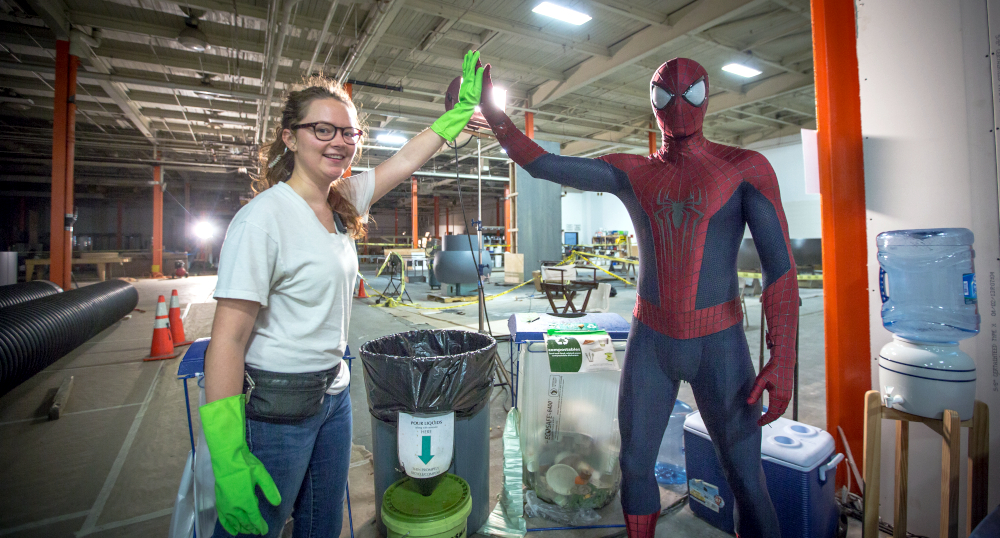From pre-production to post-production and the many stages in between, the film
industry is one of the largest producers of unnecessary
waste
in the world: From construction and set debris to costume materials and food,
utensil and foodservice-ware waste, the average TV show or movie in 2022 created
about 240 tons of
waste.
Recognition of the issue has spawned a new breed of service providers dedicated
to helping productions eliminate and redirect their
waste.
Earth Angel is one such startup that works
with productions of various sizes to reduce their carbon footprint through
education, resource management and carbon tracking with the goal of harnessing
the cultural influence of the entertainment industry to scale these efforts.
An ‘Earth Angel’ is born
After graduating from NYU’s renowned Tisch Film Program, founder
Emellie O’ Brien landed her first
role as a sustainability steward with Big Beach Films in 2011. Since her
first days in production, she knew there was a way for on-set sustainability
efforts to go beyond basic waste management and recycling. Her early years of
dedication to more conscientious practices on set earned her the nickname “Earth
Angel” from fellow crew members and colleagues — a title she took forward into
her own venture of the same name in 2013. Since then, Earth Angel has developed
a scalable model that provides film crews with strategic approaches to reducing
the environmental impact of their productions.
“I knew what a powerful medium this was and really wanted to help leverage it
toward educating folks on these important issues,” O’Brien told
Deadline
earlier this year. “It wasn’t until I got onto my first professional film set
where my eyes were really opened to the amount of resource inefficiency that was
happening.”
To date, Earth Angel has helped productions avoid over 29,000 metric tons of
carbon emissions and over 6 million plastic water bottles from being used,
divert 24 million pounds of waste, donate 711,000 pounds of material valued at
$1.98 million, and donate over 259,000 meals to local communities.
As director Darren Aronofsky
told the Hollywood
Reporter:
“When we did Noah, we knew we were
making a film about the first steward of the earth — so, we wanted to be good
stewards ourselves. There’s so much waste on film sets; and because of groups
like Earth Angel, we were able to change that a little bit.”
A savior for strapped film crews
 Earth Angel founder Emellie O’Brien on the set of The Amazing Spider-Man 2 |
Image credit: Earth Angel
Earth Angel founder Emellie O’Brien on the set of The Amazing Spider-Man 2 |
Image credit: Earth Angel
Production teams are often strapped for time, and attempting to manage
sustainability independently often means efforts fall by the wayside. Service
providers such as Earth Angel help bridge the gap between studio-level
sustainability policies and on-the-ground production support; bringing them in
as early as possible in the planning stages ensures the production is equipped
with the appropriate strategies, skilled labor, supplies and analytics to most
effectively reduce its environmental impact.
"It all starts for us in pre-production and assessing where we can help,”
explains Quinn Yawger,
Earth Angel’s Senior Manager of Production Services. "From the very beginning,
before they start building or buying their materials, is there a way we can
design it to be more sustainable?"
Earth Angel helps production teams overcome barriers to implementing responsible
production practices — including scaling mobile clean-energy solutions, such as
microgrids and solar-powered trailers; and increasing circularity by ensuring responsible sourcing
of materials and supplies, and recovery and donation strategies.
Earth Angel believes being more sustainable really means being more resourceful.
Programs are centered around efficiencies that save tens of thousands of dollars
— which is typically more than enough to recapture the cost of bringing on an
“Eco Department.” On Sony’s The Amazing Spider-Man
2 (2014), Earth Angel’s assistance in
vendor procurement, data analysis and reporting helped save the studio
approximately $400,000; and for A24's production of Aronofsky’s The
Whale (2022), the company helped divert
5.4 tons of materials from landfills and recovered an additional 2.1 tons of
donations during its wrap — achieving an overall diversion rate of 82
percent.
Among the materials donated were stage flats from the film’s set, gifted to a
local performing arts academy, and more than 1,800 meals gifted to food banks
and community organizations.
The Earth Angel team says they look forward to dynamically expanding impact and
ensuring production teams can continue to create quality content through safer,
circular, inclusive, transparent, accessible and net-zero practices.
Get the latest insights, trends, and innovations to help position yourself at the forefront of sustainable business leadership—delivered straight to your inbox.
Demitri Fierro recently earned an MBA in Sustainable Solutions from Presidio Graduate School in San Francisco. For the last two years, he has served as Program Manager for the Consultancy Shadowing Program, as well as sustainability consultant for a variety of clients. Determined to apply his background to bring sustainable solutions to storytelling and media, he is a contributor for the Environmental Media Association in Los Angeles. When he is not working to solve the climate crisis, he can be found journaling, enjoying a nice hike, watching a basketball game or learning about anthropology at a local museum.
Published Oct 11, 2024 11am EDT / 8am PDT / 4pm BST / 5pm CEST